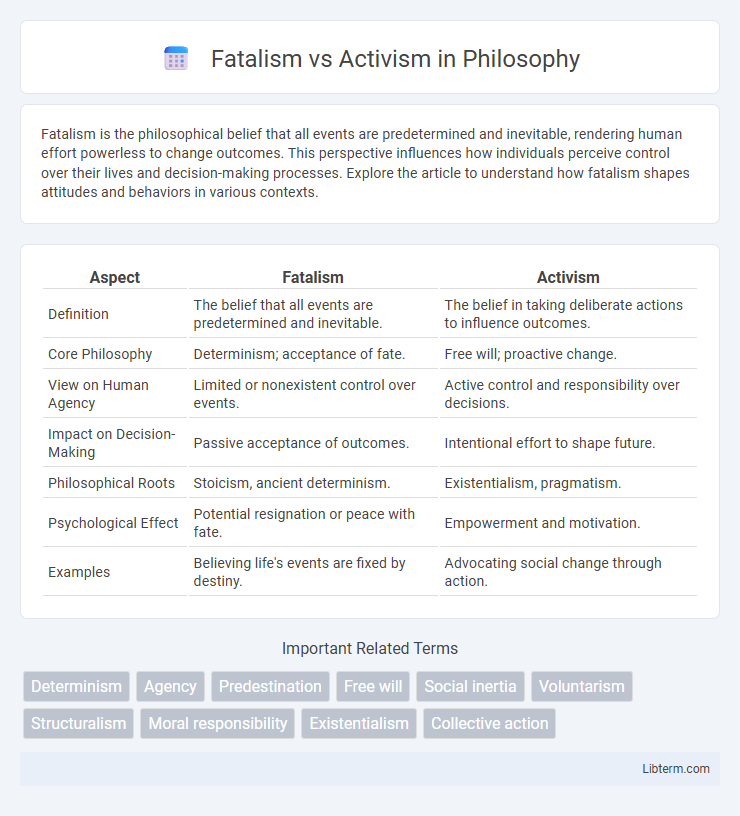Fatalism is the philosophical belief that all events are predetermined and inevitable, rendering human effort powerless to change outcomes. This perspective influences how individuals perceive control over their lives and decision-making processes. Explore the article to understand how fatalism shapes attitudes and behaviors in various contexts.
Table of Comparison
| Aspect | Fatalism | Activism |
|---|---|---|
| Definition | The belief that all events are predetermined and inevitable. | The belief in taking deliberate actions to influence outcomes. |
| Core Philosophy | Determinism; acceptance of fate. | Free will; proactive change. |
| View on Human Agency | Limited or nonexistent control over events. | Active control and responsibility over decisions. |
| Impact on Decision-Making | Passive acceptance of outcomes. | Intentional effort to shape future. |
| Philosophical Roots | Stoicism, ancient determinism. | Existentialism, pragmatism. |
| Psychological Effect | Potential resignation or peace with fate. | Empowerment and motivation. |
| Examples | Believing life's events are fixed by destiny. | Advocating social change through action. |
Understanding Fatalism: Definition and Origins
Fatalism is the philosophical doctrine asserting that all events are predetermined and inevitable, rooted in ancient Stoic and Eastern philosophies that emphasize acceptance of fate. This worldview suggests human actions have limited influence over outcomes, shaping attitudes toward destiny and control. Understanding fatalism's origins helps contrast it with activism, which advocates proactive efforts to change social and political conditions.
The Core Principles of Activism
Activism centers on the core principles of agency, collective action, and social change, emphasizing that individuals and groups can influence their circumstances and society through deliberate efforts. It advocates for proactive engagement and responsibility to challenge unjust systems and promote equity. Unlike fatalism, which accepts events as predetermined, activism drives intentional efforts to reshape the future.
Historical Roots of Fatalism and Activism
Fatalism's historical roots trace back to ancient Stoic philosophy, which emphasized acceptance of fate as an unchangeable force, influencing various cultural and religious doctrines such as Hinduism and Islam. Activism, by contrast, emerged prominently during the Enlightenment era, inspired by ideals of individual agency, social reform, and political revolution evidenced in movements like the American and French Revolutions. These divergent origins reflect fatalism's emphasis on predetermined destiny versus activism's focus on proactive change through collective human effort.
Psychological Impact of Fatalistic Thinking
Fatalistic thinking, characterized by a belief that events are predetermined and beyond personal control, can lead to increased feelings of helplessness, anxiety, and depression. This mindset often diminishes motivation, reducing proactive behavior and impairing decision-making skills. Psychological studies reveal that individuals with fatalistic attitudes are more likely to experience stress-related disorders and lower overall mental well-being compared to those with an activist mindset focused on agency and change.
Motivations Driving Activist Movements
Activist movements are primarily driven by a collective desire to challenge existing power structures and promote social justice, fueled by hope and the belief in human agency. Unlike fatalism, which accepts events as predetermined and immutable, activism emerges from motivation grounded in the conviction that change is possible through deliberate actions. Emotional engagement, perceived injustice, and the vision of a better future compel individuals to mobilize and advocate for systemic transformation.
Fatalism in Culture and Society
Fatalism in culture and society manifests as a pervasive belief that individuals have limited control over future outcomes, often leading to passive acceptance of events as predetermined or inevitable. This worldview influences social behaviors, discourages proactive engagement, and can impact collective decision-making by fostering a sense of resignation and conformity. Understanding the role of fatalism is crucial for addressing issues related to motivation, social change, and resilience within diverse cultural contexts.
Mechanisms for Social Change: Activism in Action
Activism drives social change through organized efforts like protests, lobbying, and community engagement that challenge existing power structures and promote policy reform. Strategic mobilization and grassroots movements harness collective action to amplify marginalized voices, enabling cultural shifts and systemic transformation. The effectiveness of activism relies on sustained public pressure, coalition-building, and leveraging media to influence political agendas and legislative outcomes.
Fatalism vs Activism in Modern Challenges
Fatalism in modern challenges often leads to a passive acceptance of events as predetermined, limiting proactive solutions and innovation. Activism counters this mindset by promoting active engagement and collective efforts to address issues such as climate change, social justice, and public health crises. Emphasizing agency and responsibility, activism encourages individuals and communities to drive change despite uncertainties and systemic barriers.
Overcoming Fatalism: Pathways to Empowerment
Overcoming fatalism requires shifting mindset from passive acceptance to proactive engagement by fostering self-efficacy and critical thinking skills. Empowerment pathways include education, community support, and access to resources that enable individuals to perceive control over outcomes and take meaningful actions. Activism thrives as a tool for transformation, turning perceived inevitabilities into opportunities for change and social progress.
Choosing Between Acceptance and Action
Fatalism emphasizes acceptance of predetermined outcomes, encouraging individuals to acknowledge limitations beyond their control and avoid futile resistance. Activism advocates proactive engagement, urging people to take deliberate actions to influence social, political, or environmental change and challenge existing conditions. Choosing between acceptance and action involves assessing one's agency, the potential impact of intervention, and the balance between resilience and pursuit of transformation.
Fatalism Infographic

 libterm.com
libterm.com